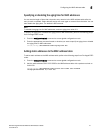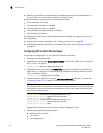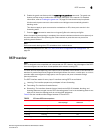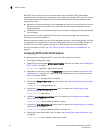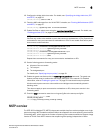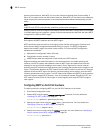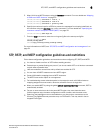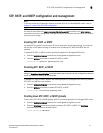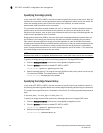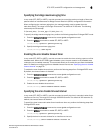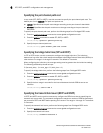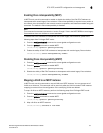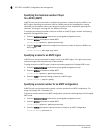Dell Converged Enhanced Ethernet Administrator’s Guide 49
53-1002116-01
STP, RSTP, and MSTP configuration guidelines and restrictions
6
5. Map a VLAN to an MSTP instance using the instance command. For more details see “Mapping
a VLAN to an MSTP instance” on page 55.
switch(conf-mstp)#instance 1 vlan 2, 3
switch(conf-mstp)#instance 2 vlan 4-6
switch(conf-mstp)#instance 1 priority 4096
6. Specify the maximum hops for a BPDU to prevent the messages from looping indefinitely on
the interface using the max-hops hop_count command. For more details see “Specifying the
maximum number of hops for a BPDU (MSTP)” on page 56.
switch(conf-mstp)#max-hops 25
7. En te r th e copy command to save the running-config file to the startup-config file.
switch(conf-mstp)#exit
switch(config)#end
switch#copy running-config startup-config
For more information on MSTP, see “STP, RSTP, and MSTP configuration and management” on
page 51.
STP, RSTP, and MSTP configuration guidelines and restrictions
Follow these configuration guidelines and restrictions when configuring STP, RSTP, and MSTP:
• You have to disable one form of xSTP before enabling another.
• Packet drops or packet flooding may occur if you do not enable xSTP on all devices connected
on both sides of parallel links.
• LAGs are treated as normal links and by default are enabled for STP.
• You can have 16 MSTP instances and one MSTP region.
• Create VLANs before mapping them to MSTP instances.
• The MSTP force-version option is not supported.
• For load balancing across redundant paths in the network to work, all VLAN-to-instance
mapping assignments must match; otherwise, all traffic flows on a single link.
• When you enable MSTP by using the global protocol spanning-tree mstp command, RSTP is
automatically enabled.
• For two or more switches to be in the same MSTP region, they must have the same
VLAN-to-instance map, the same configuration revision number, and the same name.
• Spanning Tree topologies must not be enabled on any direct server connections to the
front-end Ten Gigabit Ethernet ports that may run FCoE traffic. This may result in lost or
dropped FCoE logins.



